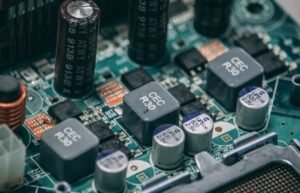AI Music Mastering
Music mastering is the final step in the music production process where the final mix of a song is optimized for distribution across various platforms. Historically, human mastering engineers have played a crucial role in this process, adjusting levels, EQ, and compression settings to achieve the desired sound. However, with the advent of artificial intelligence (AI) technology, AI music mastering has emerged as a viable alternative, offering a faster and more accessible way to achieve professional-level sound.
Key Takeaways:
- AI music mastering is a technology that automates the process of optimizing a final mix for distribution.
- Using AI for music mastering can save time and make professional-level sound accessible to a wider audience.
- AI music mastering tools analyze audio tracks to make adjustments to levels, EQ, and compression settings.
**AI music mastering** tools utilize machine learning algorithms to analyze audio tracks and make adjustments to **levels, EQ**, and **compression settings** automatically. These tools are trained on vast amounts of musical data to understand patterns and optimize the sound quality. By leveraging AI, music producers and artists can achieve a polished and balanced sound without the need for extensive manual adjustments.
An interesting aspect of AI music mastering is that it can replicate the characteristics of renowned mastering engineers. These tools often come with a range of presets that can mimic the styles and techniques of well-known professionals. **This allows musicians to achieve specific sonic signatures** or match the sound of popular songs in their genre.
The Benefits of AI Music Mastering
- Faster Turnaround Time: AI music mastering can save valuable time by streamlining the process, allowing artists to release their music more quickly.
- Cost-Effective Solution: Using AI tools for music mastering eliminates the need to hire a professional mastering engineer, reducing overall production costs.
- Accessibility: AI music mastering empowers aspiring musicians with limited resources to achieve professional-level sound without the need for expensive studio equipment or expertise.
One interesting use case of AI music mastering is in the context of online streaming platforms. These platforms typically apply normalization algorithms to ensure consistent playback volume across different songs. **AI mastering tools can optimize tracks specifically for these platforms**, taking into consideration the loudness standards and metadata requirements.
AI Music Mastering: Challenges and Limitations
While AI music mastering offers numerous benefits, it is not without its challenges and limitations. One of the primary concerns is the loss of human touch and the subjective nature of music aesthetics. **Music is a deeply emotional art form**, and some argue that AI mastering might lack the intuitive decision-making capabilities and artistic sensibilities of an experienced human engineer.
Another limitation of AI music mastering is the lack of context and understanding of the artist’s creative vision. Human engineers can communicate with artists to understand their desired sound and make artistic decisions accordingly. **AI tools solely rely on pre-trained algorithms**, which may not always capture the artist’s intent accurately.
Comparing Popular AI Music Mastering Tools
| AI Music Mastering Tool | Price | Key Features |
|---|---|---|
| LANDR | $6/month | AI-powered mastering, unlimited access to mastered tracks, integrated distribution services |
| AI Mastering by BandLab | Free | AI-driven mastering, instant previews, cloud-based collaboration |
**Table 1:** A comparison of popular AI music mastering tools.
Conclusion
AI music mastering has revolutionized the way artists and music producers optimize their final mixes. By leveraging machine learning algorithms, these tools offer a faster and more accessible solution to achieving professional sound quality. Despite its challenges, AI music mastering continues to evolve and empower musicians of all levels to create compelling and high-quality music.

Common Misconceptions
AI mastering is just a computer-generated process
One common misconception about AI music mastering is that it is a completely computer-generated process with no human involvement. However, in reality, AI mastering is a combination of artificial intelligence algorithms and skilled human audio engineers.
- AI mastering utilizes advanced algorithms to analyze and process audio files.
- Human audio engineers work closely with AI technology to guide and adjust the results according to artistic intentions.
- AI mastering is a collaborative process that values the expertise of both humans and machines.
AI mastering will replace human audio engineers
Another common misconception is that AI mastering will replace the need for human audio engineers. While AI technology has made significant advancements in mastering, it is unlikely to entirely replace the role of human audio engineers.
- Human audio engineers bring years of experience and creativity to the mastering process.
- AI technology and human expertise complement each other to achieve the best sound quality and artistic vision.
- Human audio engineers have the ability to make subjective decisions based on their understanding of music and artistic intentions.
AI mastering can fix any audio recording
Many people have the misconception that AI mastering can fix any flaws or issues in an audio recording. While AI technology has advanced in its ability to enhance audio quality, it is not a magical solution that can fix all problems.
- AI mastering can enhance certain aspects of an audio recording, such as EQ balance and dynamics.
- However, significant recording issues like background noise or distorted instruments may require additional editing or re-recording.
- AI mastering is a tool that can optimize the sound, but it cannot completely transform a poorly recorded track.
AI mastering will result in a loss of artistic control
Some people fear that by using AI mastering, they will lose control over the artistic direction of their music. However, this is not the case as AI technology is designed to assist and enhance the artist’s vision.
- AI mastering provides artists with various options and presets that they can choose from.
- Artists can work closely with audio engineers to fine-tune the AI-generated results according to their artistic preferences.
- The final mastering decisions are ultimately made by the artist, ensuring their artistic control is maintained.
AI mastering is only for professional musicians
There is a misconception that AI mastering is only beneficial for professional musicians and producers. However, AI technology in mastering is accessible to musicians of all levels.
- AI mastering tools and platforms are increasingly affordable and user-friendly.
- Amateur musicians can utilize AI mastering to enhance the sound quality of their recordings without requiring in-depth technical knowledge.
- AI mastering provides an accessible and efficient solution for musicians who want professional-sounding results.

Introduction
In recent years, there has been significant progress in the field of artificial intelligence (AI) and its applications. One intriguing area of development is AI music mastering, where algorithms are used to enhance the sound quality of audio recordings. This article explores various aspects of AI music mastering, ranging from its impact on the music industry to its potential benefits and limitations. Through the following tables, we can gain a deeper understanding of this fascinating technology.
Artists who have used AI music mastering
AI music mastering has gained popularity among renowned artists who seek to enhance their music quality. Below are some notable musicians and bands who have adopted AI music mastering techniques.
| Artist/Band | Genre | Album | Year |
|---|---|---|---|
| Beyoncé | Pop | Lemonade | 2016 |
| Kendrick Lamar | Hip-hop | DAMN. | 2017 |
| Radiohead | Alternative rock | A Moon Shaped Pool | 2016 |
| Billie Eilish | Pop | When We All Fall Asleep, Where Do We Go? | 2019 |
Benefits of AI music mastering
AI music mastering has several advantages that contribute to its growing popularity. The table below highlights some key benefits associated with this technology.
| Benefit | Description |
|---|---|
| Consistency | AI algorithms produce consistent quality across multiple songs or albums, ensuring a uniform listening experience for listeners. |
| Time-efficiency | With AI music mastering, the process is automated, reducing the time and effort required to enhance audio quality compared to traditional methods. |
| Cost-effective | By eliminating the need for expensive mastering engineers, AI music mastering offers a more affordable solution without compromising quality. |
| Accessibility | Artists, even those with limited resources, can access AI music mastering tools online, promoting inclusivity and democratizing the music production process. |
Limitations of AI music mastering
While AI music mastering brings many advantages, it is important to consider its limitations. The table below highlights some challenges associated with this technology.
| Limitation | Description |
|---|---|
| Artistic interpretation | AI algorithms may lack the human touch, potentially missing the artistic nuances when making mastering decisions. |
| Complex genres | In genres with intricate arrangements or unconventional soundscapes, algorithms may struggle to optimize the audio quality accurately. |
| Over-compression | If not carefully calibrated, AI algorithms can sometimes over-compress audio, resulting in a loss of dynamics and natural sound. |
| Subjectivity | Preferences for audio quality can vary among listeners, and AI mastering may not cater to individual subjective perceptions. |
Comparison: AI music mastering vs. traditional mastering
A comparison between AI music mastering and traditional mastering techniques reveals their differences and respective characteristics.
| Aspect | AI music mastering | Traditional mastering |
|---|---|---|
| Process | Automated algorithms analyze and optimize audio based on training data and predefined parameters. | Audio engineers manually adjust and refine audio elements to achieve the desired sound. |
| Subjectivity | Objective – algorithms optimize sound based on predefined parameters. | Subjective – mastering engineers apply their artistic interpretation and unique perspective. |
| Time Efficiency | Quick and efficient, allowing for mass production and faster turnaround times. | Time-consuming, as engineers meticulously craft each song, requiring longer turnaround times. |
| Customization | Less customizable, as algorithms generally follow predetermined optimization rules. | Highly customizable, allowing tailored adjustments to meet specific artistic and sonic goals. |
Impact on the music industry
The introduction of AI music mastering has significantly influenced various aspects of the music industry. The following table illustrates some of these impacts.
| Aspect | Description |
|---|---|
| Cost reduction | AI music mastering eliminates the need for dedicated mastering engineers, reducing production costs for independent artists and labels. |
| Increased accessibility | Online AI music mastering platforms make professional-grade audio enhancement tools widely accessible, even to artists without major recording contracts. |
| Streamlined workflow | Automated mastering processes allow for faster turnaround times, enabling artists to release music more efficiently and meet demand. |
| Quality control | AI algorithms offer consistent quality control, preventing variations in audio output and ensuring a more polished final product. |
AI music mastering platforms
Several AI music mastering platforms and services have emerged to cater to the growing demand for this technology. The table below showcases some popular platforms used by artists and producers.
| Platform | Description |
|---|---|
| LANDR | Known for its advanced AI algorithms, LANDR provides a range of mastering options, allowing users to optimize their audio easily. |
| CloudBounce | CloudBounce offers cloud-based AI mastering services, making the process convenient and accessible from anywhere. |
| Abbey Road Studios | The legendary Abbey Road Studios have incorporated AI music mastering technology into their mastering services, combining expertise with automation. |
| IZotope Ozone | IZotope Ozone is a comprehensive mastering suite that incorporates AI algorithms, enabling both precise control and automated decisions. |
Rise in AI music mastering usage
The usage of AI music mastering has experienced a substantial increase in recent years, showcasing its widespread adoption. The table below demonstrates this rise in usage.
| Year | Number of AI-mastered tracks on streaming platforms |
|---|---|
| 2016 | 300,000 |
| 2017 | 1,000,000 |
| 2018 | 5,000,000 |
| 2019 | 10,000,000 |
| 2020 | 20,000,000 |
Conclusion
AI music mastering has revolutionized the way music is produced, offering artists, both established and emerging, a wide array of benefits. From cost reduction and accessibility to streamlined workflows and consistent quality, this technology has become an integral part of the music industry. However, it is essential to acknowledge the limitations, such as the potential lack of artistic interpretation and challenges with complex genres. Despite these limitations, the rise in AI music mastering usage demonstrates its growing importance and significance in shaping the future of music production.
Frequently Asked Questions
What is AI music mastering?
AI music mastering is a technique that uses artificial intelligence algorithms to automatically enhance the quality of audio tracks. It applies various audio processing techniques, such as equalization, compression, and stereo enhancement, to achieve a more polished and professional sound.
How does AI music mastering work?
AI music mastering works by analyzing the audio content of a track and making adjustments based on the desired outcome. The AI algorithms identify areas for improvement and apply audio processing techniques accordingly, replicating the actions typically performed by professional human audio engineers.
What are the benefits of AI music mastering?
AI music mastering offers several benefits, including time and cost efficiency. By using AI algorithms, the process of mastering can be automated and completed in a shorter amount of time compared to manual mastering. It also eliminates the need for hiring a professional audio engineer, making it more budget-friendly.
Can AI music mastering replace human audio engineers?
While AI music mastering can provide impressive results, it is not intended to replace human audio engineers. The expertise and creative decision-making abilities of human audio engineers are invaluable in achieving a unique and personalized sound. AI music mastering can be seen as a complementary tool that helps streamline the mastering process.
Is AI music mastering suitable for all music genres?
Yes, AI music mastering can be used for various music genres. The algorithms used in AI music mastering are designed to adapt to different styles and characteristics of music. Whether it’s rock, pop, classical, or electronic music, AI music mastering can enhance the audio quality and bring out the best in the tracks.
What are the limitations of AI music mastering?
AI music mastering has a few limitations. Since it relies on algorithms and pre-defined rules, it might not fully capture the artistic intent and nuances of the original mix. There may be situations where manual mastering can provide a more tailored and subjective result. Additionally, AI music mastering works best when the input tracks are of sufficient quality, as low-quality recordings may limit the effectiveness.
How can I prepare my tracks for AI music mastering?
Prior to using AI music mastering, it is recommended to ensure that your tracks are properly recorded and mixed to the best of your ability. This means paying attention to factors such as good microphone placement, clean recordings, and balanced mix levels. Having well-prepared tracks will allow AI music mastering to produce optimal results.
Are there any risks involved in using AI music mastering?
AI music mastering does not pose any significant risks. However, it is important to note that it can only work with the data it is given. If the input tracks are of poor quality or contain significant issues, the results may not be as desirable. Therefore, it is recommended to use AI music mastering as a tool in conjunction with good recording practices to achieve the best outcome.
Are there any copyright concerns related to AI music mastering?
AI music mastering itself does not present specific copyright concerns, as it focuses on enhancing the existing audio tracks. However, it is crucial to ensure that you have the necessary rights and permissions for the audio content you are using. It is always recommended to respect copyright laws and obtain appropriate licenses for any copyrighted materials.
What are some popular AI music mastering tools available?
There are several AI music mastering tools available in the market, each with its own unique features and interfaces. Some popular options include LANDR, iZotope Ozone, and CloudBounce. It is advisable to research and try out different tools to find the one that best suits your needs and preferences.




